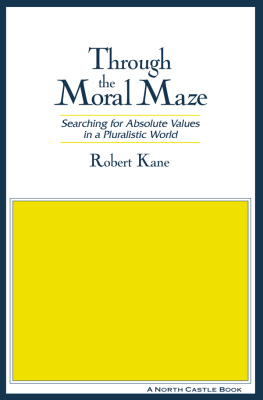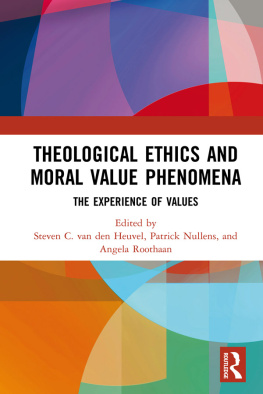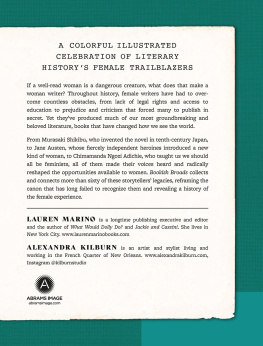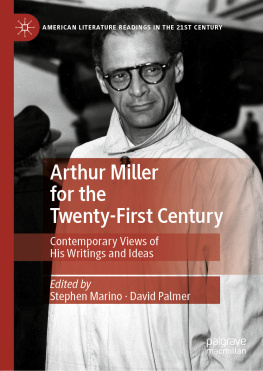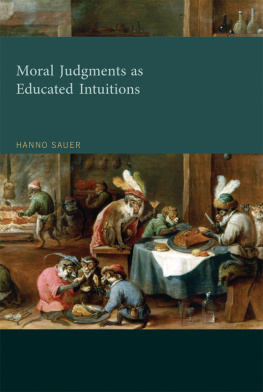Patricia Marino - Moral reasoning in a pluralistic world
Here you can read online Patricia Marino - Moral reasoning in a pluralistic world full text of the book (entire story) in english for free. Download pdf and epub, get meaning, cover and reviews about this ebook. year: 2015, publisher: MQUP, genre: Romance novel. Description of the work, (preface) as well as reviews are available. Best literature library LitArk.com created for fans of good reading and offers a wide selection of genres:
Romance novel
Science fiction
Adventure
Detective
Science
History
Home and family
Prose
Art
Politics
Computer
Non-fiction
Religion
Business
Children
Humor
Choose a favorite category and find really read worthwhile books. Enjoy immersion in the world of imagination, feel the emotions of the characters or learn something new for yourself, make an fascinating discovery.

- Book:Moral reasoning in a pluralistic world
- Author:
- Publisher:MQUP
- Genre:
- Year:2015
- Rating:4 / 5
- Favourites:Add to favourites
- Your mark:
- 80
- 1
- 2
- 3
- 4
- 5
Moral reasoning in a pluralistic world: summary, description and annotation
We offer to read an annotation, description, summary or preface (depends on what the author of the book "Moral reasoning in a pluralistic world" wrote himself). If you haven't found the necessary information about the book — write in the comments, we will try to find it.
Moral reasoning in a pluralistic world — read online for free the complete book (whole text) full work
Below is the text of the book, divided by pages. System saving the place of the last page read, allows you to conveniently read the book "Moral reasoning in a pluralistic world" online for free, without having to search again every time where you left off. Put a bookmark, and you can go to the page where you finished reading at any time.
Font size:
Interval:
Bookmark:
MORAL REASONING IN A PLURALISTIC WORLD
in a Pluralistic World
PATRICIA MARINO

McGill-Queens University Press 2015
ISBN 978-0-7735-4614-1 (cloth)
ISBN 978-0-7735-4615-8 (paper)
ISBN 978-0-7735-9756-3 (ePDF)
ISBN 978-0-7735-9757-0 (ePUB)
Legal deposit third quarter 2015
Bibliothque nationale du Qubec
Printed in Canada on acid-free paper that is 100% ancient forest free (100% post-consumer recycled), processed chlorine free.
This book was published with the help of a grant from the Canadian Federation for the Humanities and Social Sciences, through the Awards to Scholarly Publications Program, using funds provided by the Social Sciences and Humanities Research Council of Canada.
McGill-Queens University Press acknowledges the support of the Canada Council for the Arts for our publishing program. We also acknowledge the financial support of the Government of Canada through the Canada Book Fund for our publishing activities.
Library and Archives Canada Cataloguing in Publication
Marino, Patricia, 1966, author
Moral reasoning in a pluralistic world / Patricia Marino.
Includes bibliographical references and index.
Issued in print and electronic formats.
ISBN 978-0-7735-4614-1 (bound). ISBN 978-0-7735-4615-8 (pbk.)
ISBN 978-0-7735-9756-3 (ePDF). ISBN 978-0-7735-9757-0 (ePUB)
1. Ethics. 2. Reasoning. 3. Pluralism. I. Title.
BJ1025.M37 2015 | C2015-902833-7 | |
C2015-902834-5 |
This book was typeset by True to Type in 10.5/13 Sabon
For Jonathan
I have been thinking about the ideas in this book for a number of years, and I am grateful to the many people who contributed to their development. In graduate school I was fortunate to take a class on moral dilemmas with the late Ruth Marcus, and it was there I began to think about morality and conflict. Though I was working on different topics at that time, my PhD supervisor Penelope Maddy has taught me so much about philosophical thinking and writing over the years that all of my work bears the imprint of her teaching.
Lorraine Besser-Jones, Luke Brunning, Dave DeVidi, Emma Dewald, Mathieu Doucet, Doreen Fraser, Allan Gibbard, Alan Goldman, Patricia Greenspan, Nicole Hassoun, Tom Hurka, Chris Kaposy, and Tim Kenyon all contributed insightful comments on earlier versions of this work. Jonathan Dewald, Penelope Maddy, and Paul Thagard not only helped at many points along the way but also read the whole manuscript; their thoughts and suggestions greatly improved the final manuscript.
I have presented parts of this work at the Western Canadian Philosophical Association Meeting in 2006, the Canadian Philosophical Annual Meetings in 2007 and 2010, the American Philosophical Association Central Division Meetings in 2007 and 2008, the North American Society for Social Philosophy conference in 2009, the American Philosophical Association Eastern Division Meeting in 2009, the American Philosophical Association Pacific Division Meeting in 2010, the Departments of Philosophy at Wilfrid Laurier University, Ryerson University, University of Toronto, University of Guelph, Southern Illinois University, and University of Waterloo, and the Joint Centre for Bioethics in Toronto. Discussion with audiences there improved this work substantially. Im especially grateful to Nathan Brett, Eugene Heath, Tristram McPherson, Sergio Tenenbaum, and Mark van Roojen for their probing questions.
Elements of this work appeared previously in Moral Dilemmas, Collective Responsibility, and Moral Progress, Philosophical Studies 104 (2001): 20325, Moral Rationalism and the Normative Status of Desiderative Coherence, Journal of Moral Philosophy 7 (2010): 22752, Ambivalence, Valuational Inconsistency, and the Divided Self, Philosophy and Phenomenological Research 83 (2011): 4171, Moral Coherence and Value Pluralism, Canadian Journal of Philosophy 43 (2013): 11735, Moral Coherence and Principle Pluralism, Journal of Moral Philosophy 11/6 (2014): 72749. The critical and constructive comments that I received from reviewers for these journals have been immensely helpful.
This research was supported by the Social Sciences and Humanities Research Council of Canada, in part through a generous Standard Research Grant. My research assistants Rosalind Abdool and Kirsten MacDonald, funded through this grant, not only helped with details but also provided insightful feedback. This book has been published with the help of a grant from the Federation for the Humanities and Social Sciences, through the Awards to Scholarly Publications Program, using funds provided by the Social Sciences and Humanities Research Council of Canada. The University of Waterloo also supported this work through sabbatical leaves.
Two anonymous referees for McGill-Queens University Press provided reports that were the perfect mix of encouragement and criticism. Mark Abley, my editor at MQUP, made the publication process smooth, constructive, and pleasant, and Kathryn Simpsons perceptive questions during the copy-editing phase led to substantial improvements in the text.
For a long time now my partner Jonathan Dewald has been a source of intellectual inspiration and my most penetrating philosophical interlocutor. With love and gratitude, this book is dedicated to him.
MORAL REASONING IN A PLURALISTIC WORLD
This book concerns moral reasoning: the process we engage in or ought to engage in when we try to figure out what is right and wrong and why. Moral reasoning is puzzling. On the one hand, moral disagreement and the diversity of moral thinking around the world might seem to show that moral justification is simply impossible. Moral judgments vary greatly from place to place, time to time, and even from person to person. If morality is based on reason, we should expect there to be a single morally correct point of view; it would follow that beliefs that disagree with this single truth are simply mistaken. This strikes many people as both implausible, since it entails that so many people would have to get so many things wrong over a long period of time, and dangerous, since it seems close to imperialism to say that we have got it right and everyone else has got it wrong.
On the other hand, almost everyone engages in moral reasoning, if only to find fault with those they disagree with. We know that if a person were to say, I believe abortion is morally wrong, but I believe its okay for me to have one, then something would have gone wrong. Arguments against the permissibility of abortion are often criticized for ignoring the rights of women to control what happens in and to their bodies. Arguments for the permissibility of abortion are often criticized for failing to apply the same standard to some forms of human life that are applied to others. These are examples of using reason to figure out what to believe and of trying to convince others what to believe in the moral realm.
Moral arguments often make a difference to us. It used to be thought that a man could not rape his wife: marriage implied unity of a man
Most broadly, the question of this book is how moral reasoning is best understood in a world with varying moral outlooks, a diversity of moral views, and substantial moral disagreement. Though moral diversity has sometimes been associated with moral skepticism, recent empirical research suggests that such diversity is best explained by appeal to the fact that the way people value is pluralistic in two senses. First, we have a number of common but distinct moral cares, such as benevolence, fairness, honesty, and loyalty. Second, different people direct those cares at different objects and prioritize among them in different ways. These pluralisms help explain why there is diversity in moral judgments: in deciding whether it is appropriate to lie to protect a friend, a person who values honesty most may say no, while one who values loyalty most may say yes. This connection between diversity and conflict explains why so much moral disagreement seems to arise in the contexts of dilemmas, in which there is more than one value at stake and we feel pulled in different directions.
Next pageFont size:
Interval:
Bookmark:
Similar books «Moral reasoning in a pluralistic world»
Look at similar books to Moral reasoning in a pluralistic world. We have selected literature similar in name and meaning in the hope of providing readers with more options to find new, interesting, not yet read works.
Discussion, reviews of the book Moral reasoning in a pluralistic world and just readers' own opinions. Leave your comments, write what you think about the work, its meaning or the main characters. Specify what exactly you liked and what you didn't like, and why you think so.

